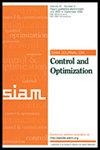基于采样数据的有限维观测器控制一维随机抛物多项式方程
IF 2.4
2区 数学
Q2 AUTOMATION & CONTROL SYSTEMS
引用次数: 0
摘要
SIAM 控制与优化期刊》第 62 卷第 1 期第 297-325 页,2024 年 2 月。 摘要PDEs的采样数据控制已成为一个活跃的研究领域;然而,现有成果仅限于确定性PDEs。随机 PDE 的采样数据控制器设计是一个具有挑战性的开放问题。在本文中,我们通过模态分解方法为离散时间非局部测量条件下的一维随机扩散-反应方程提出了一个解决方案,其中所考虑的系统和测量都受到非线性乘法噪声的影响。我们提出了两种方法:一种是通过零阶保持装置实现采样数据控制器的直接方法,另一种是通过广义保持装置实现采样数据控制器的基于动态扩展的方法。对于这两种方法,我们都提供了全阶闭环系统的均方[数学]指数稳定性分析。我们构建了一个 Lyapunov 函数[数学],它取决于闭环系统有限维部分的确定性和随机性部分。我们分别采用随机 ODE 和 PDE 的相应 Itô 公式,并进一步将 [math] 与关于 [math] 期望值的 Halanay 不等式相结合,以补偿无限维尾部的采样。我们提供了线性矩阵不等式 (LMI),用于寻找观察者维度以及保持均方指数稳定性的采样间隔和噪声强度的上限。我们证明,对于足够大的观察者维度以及足够小的采样间隔和噪声强度边界,线性矩阵不等式总是可行的。一个数值示例证明了我们方法的效率。该示例表明,在噪声强度界限相同的情况下,基于动态扩展的控制器允许更大的采样间隔,但这是由于其复杂性造成的(与直接方法的零阶保持相比,采样数据实现的广义保持设备)。本文章由计算机程序翻译,如有差异,请以英文原文为准。
Sampled-Data Finite-Dimensional Observer-Based Control of 1D Stochastic Parabolic PDEs
SIAM Journal on Control and Optimization, Volume 62, Issue 1, Page 297-325, February 2024.
Abstract. Sampled-data control of PDEs has become an active research area; however, existing results are confined to deterministic PDEs. Sampled-data controller design of stochastic PDEs is a challenging open problem. In this paper we suggest a solution to this problem for 1D stochastic diffusion-reaction equations under discrete-time nonlocal measurement via the modal decomposition method, where both the considered system and the measurement are subject to nonlinear multiplicative noise. We present two methods: a direct one with sampled-data controller implemented via zero-order hold device, and a dynamic-extension-based one with sampled-data controller implemented via a generalized hold device. For both methods, we provide mean-square [math] exponential stability analysis of the full-order closed-loop system. We construct a Lyapunov functional [math] that depends on both the deterministic and stochastic parts of the finite-dimensional part of the closed-loop system. We employ corresponding Itô’s formulas for stochastic ODEs and PDEs, respectively, and further combine [math] with Halanay’s inequality with respect to the expected value of [math] to compensate for sampling in the infinite-dimensional tail. We provide linear matrix inequalities (LMIs) for finding the observer dimension and upper bounds on sampling intervals and noise intensities that preserve the mean-square exponential stability. We prove that the LMIs are always feasible for large enough observer dimension and small enough bounds on sampling intervals and noise intensities. A numerical example demonstrates the efficiency of our methods. The example shows that for the same bounds on noise intensities, the dynamic-extension-based controller allows larger sampling intervals, but this is due to its complexity (generalized hold device for sample-data implementation compared to zero-order hold for the direct method).
Abstract. Sampled-data control of PDEs has become an active research area; however, existing results are confined to deterministic PDEs. Sampled-data controller design of stochastic PDEs is a challenging open problem. In this paper we suggest a solution to this problem for 1D stochastic diffusion-reaction equations under discrete-time nonlocal measurement via the modal decomposition method, where both the considered system and the measurement are subject to nonlinear multiplicative noise. We present two methods: a direct one with sampled-data controller implemented via zero-order hold device, and a dynamic-extension-based one with sampled-data controller implemented via a generalized hold device. For both methods, we provide mean-square [math] exponential stability analysis of the full-order closed-loop system. We construct a Lyapunov functional [math] that depends on both the deterministic and stochastic parts of the finite-dimensional part of the closed-loop system. We employ corresponding Itô’s formulas for stochastic ODEs and PDEs, respectively, and further combine [math] with Halanay’s inequality with respect to the expected value of [math] to compensate for sampling in the infinite-dimensional tail. We provide linear matrix inequalities (LMIs) for finding the observer dimension and upper bounds on sampling intervals and noise intensities that preserve the mean-square exponential stability. We prove that the LMIs are always feasible for large enough observer dimension and small enough bounds on sampling intervals and noise intensities. A numerical example demonstrates the efficiency of our methods. The example shows that for the same bounds on noise intensities, the dynamic-extension-based controller allows larger sampling intervals, but this is due to its complexity (generalized hold device for sample-data implementation compared to zero-order hold for the direct method).
求助全文
通过发布文献求助,成功后即可免费获取论文全文。
去求助
来源期刊
CiteScore
4.00
自引率
4.50%
发文量
143
审稿时长
12 months
期刊介绍:
SIAM Journal on Control and Optimization (SICON) publishes original research articles on the mathematics and applications of control theory and certain parts of optimization theory. Papers considered for publication must be significant at both the mathematical level and the level of applications or potential applications. Papers containing mostly routine mathematics or those with no discernible connection to control and systems theory or optimization will not be considered for publication. From time to time, the journal will also publish authoritative surveys of important subject areas in control theory and optimization whose level of maturity permits a clear and unified exposition.
The broad areas mentioned above are intended to encompass a wide range of mathematical techniques and scientific, engineering, economic, and industrial applications. These include stochastic and deterministic methods in control, estimation, and identification of systems; modeling and realization of complex control systems; the numerical analysis and related computational methodology of control processes and allied issues; and the development of mathematical theories and techniques that give new insights into old problems or provide the basis for further progress in control theory and optimization. Within the field of optimization, the journal focuses on the parts that are relevant to dynamic and control systems. Contributions to numerical methodology are also welcome in accordance with these aims, especially as related to large-scale problems and decomposition as well as to fundamental questions of convergence and approximation.

 求助内容:
求助内容: 应助结果提醒方式:
应助结果提醒方式:


